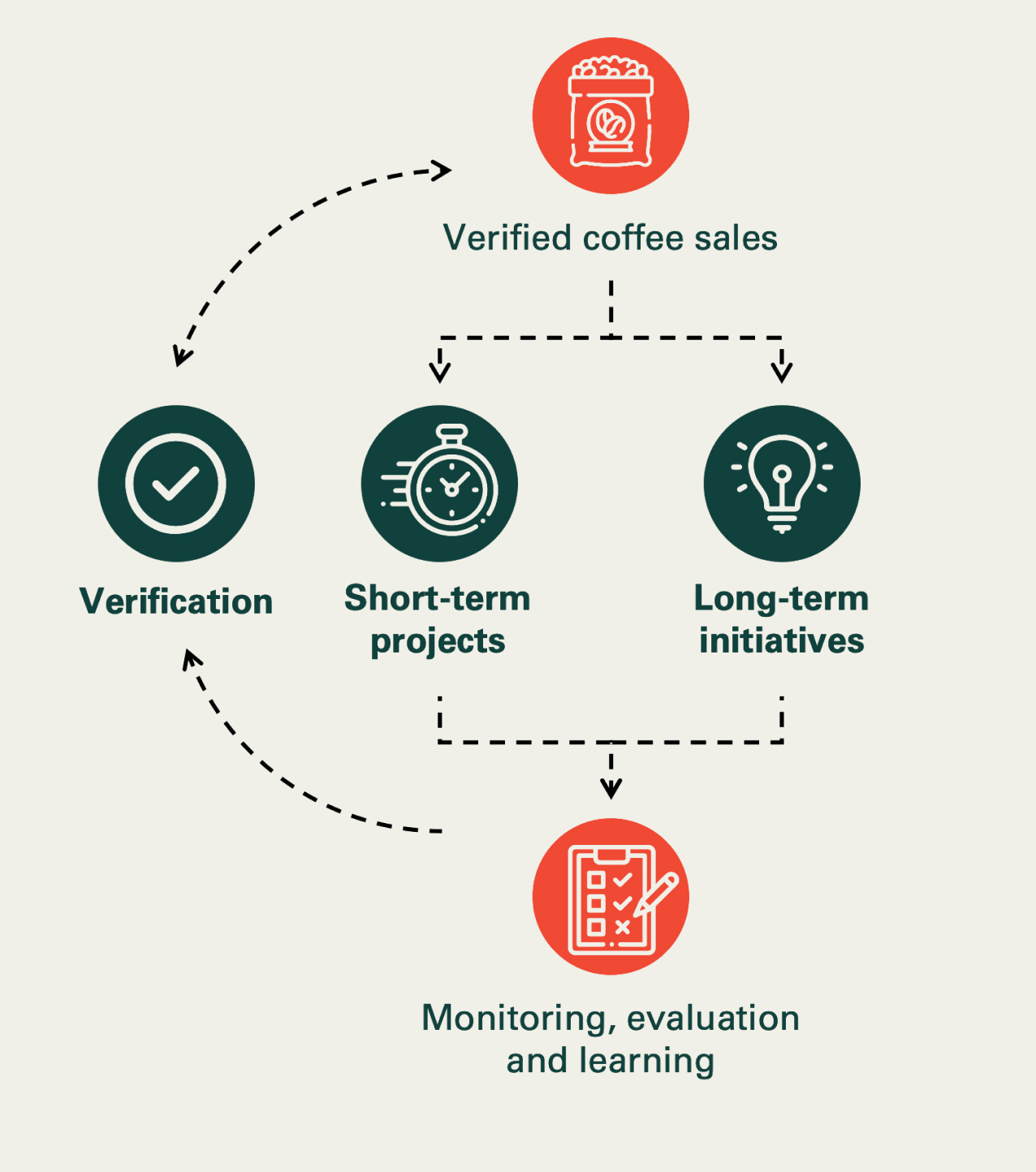CONNECT is HACOFCO's Sustainability Program
designed to bridge the gap between farmers and customers. By fostering collaboration, transparency, and mutual support, this initiative aims to create more resilient supply chains, ensuring a sustainable supply of coffee in the long term.

Objectives of the program:
- To offer Hacofco customers the opportunity to get closer to the coffee suppliers by buying verified coffee and support a continuous improvement process in the supply chain.
- To create opportunities for Hacofco supply chains to strengthen sustainable production systems.
In the long term, the implementation of CONNECT will transform the supply chains involved by:
- Strengthening their capacity to identify and close gaps in terms of sustainability: through the verification process the supply chain management system will develop or strengthen their ability to assess the sustainability performance of the supply chain and identify areas of improvement.
- Providing specific support needed: by presenting to customers projects and fund requests and giving to the customers the opportunity to claim the impact of the projects.
- Opening access to stable markets for sustainable coffee ensures the profitability of the business.
Implementation process:

1. Verification:
Each supply chain participating in the program will receive an external audit from a certification body hired by Hacofco, who will evaluate the supply chain with Hacofco Sustainability Standard.
The rules for the verification are detailed in the Verification Protocol. The Sustainable Supply Chain Department evaluates the results of the external audit and confirms the verify status of each supply chain.
CONNECT aims to guide the supply chain in a continuous improvement process and to validate during the audits that they’re making improvements to ensure the implementation of sustainable production systems.
Once the verification is achieved, Hacofco's customers can buy CONNECT verified coffee with options to make claims following Hacofco’s „Claims Policies and Procedures“
The Sustainability Standard is developed by the Sustainable Supply Chain Department within Hacofco, and it is approved by Hacofco Sustainability Committee. The standard is reviewed every three years, even though our key stakeholders are invited to provide their feedback about the applicability of the criteria and the implementation rules at any time, by sending an email to the following address:
connect@hacofco.de
2. Specialized projects:
The main findings of the audit will be discussed with the supply chain manager, and the identified gaps or improvements areas will be used to prepare and present short-term projects to the customers buying the verified coffee, or any other relevant stakeholder that may be interested in supporting the supply chain. By buying verified coffee, the customer is not obligated to invest in the supply chain, the option to support a specific project will be presented and it can also be adapted based on the customer sustainability targets.
This type of project will target specific gaps in the supply chain and once implemented the project a continuity is not considered unless requested by the customer. The impact of these projects will be evidenced during the audit, during or after the implementation.
Our customers have three options to engage with the CONNECT Program:


3. Connection with a supply chain:
Customers looking for a more committed relationship with the supply chain will have the option to sponsor a specific cluster of farmers. The interventions at farm or supply chain management system level will be determined based on audit findings, customer’s sustainability targets and specific requirements from the supply chain.
In this type of project, the farmers will be identified with the customer supporting the supply chain; and a continuous flow of information about the progress and impact of the interventions will be shared with the customer. It’s expected that farmers in these clusters will maintain an advance level of compliance with Hacofco Sustainability Standard after the second year of implementation.
Monitoring, Evaluation and Learning:
With the implementation of this strategy, a monitoring and evaluation system will collect, validate, and process the data from the supply chains and the activities implemented to be able to report the progress and impact of the program and at the same time identified key learnings during the implementation process to make timely decisions to improve the program.

Complaints Procedure
Hacofco’s complaint management procedure ensures transparency in the CONNECT program. Stakeholders can submit complaints via connect@hacofco.de, providing relevant details and evidence. The Hacofco Sustainability Team reviews cases within 10 working days, and the Sustainability Committee assesses all complaints, deciding on next steps within 30 working days.

Ear4U
Hacofco participates in Ear4U, an independent grievance mechanism for the coffee sector. This online platform enables anonymous complaints to be submitted across our supply chains. In collaboration with the German Coffee Association and other industry partners, we have developed this joint initiative to provide all actors in the supply chain with an accessible and secure way to voice concerns.
